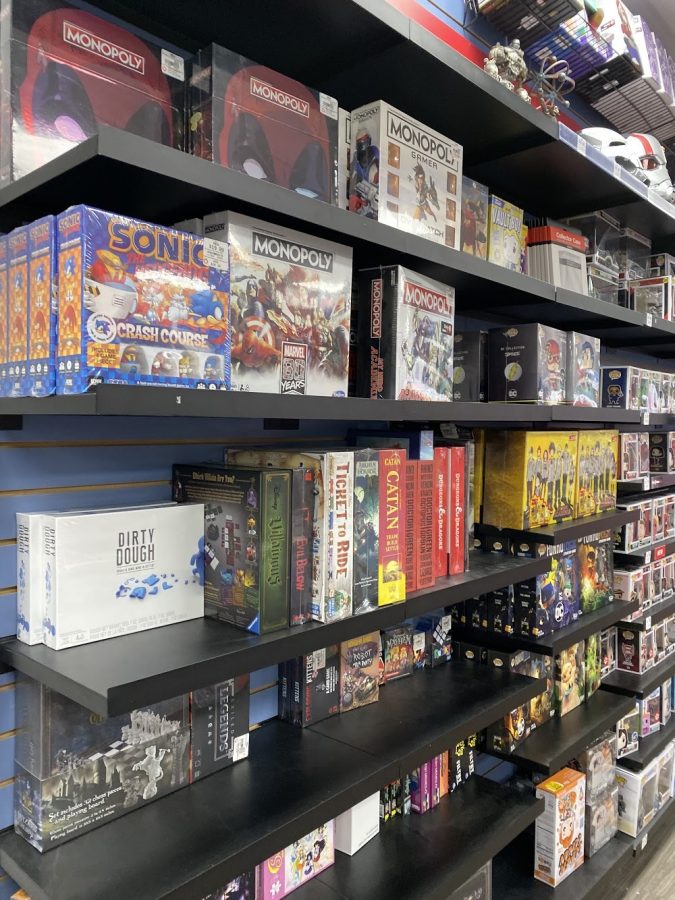Cardboard to Pixels: the evolution of games
Imagine a world without Monopoly. For some, the world wouldn’t be too different. For others, it was what brought their family together. Maybe it wasn’t Monopoly, but Scrabble or Candyland instead. Regardless, board games have a long history. Senet, the first known “game,” is thought to have been invented in 3500 BCE by Egyptians.
Tara Hower started playing Atari when she was younger and grew up playing games as they evolved technologically.
“I honestly believe board games will always exist,” Hower said.
Fast forward to 1958 when William Hinginbotham created the first “video game,” Tennis for Two. A dial was used to adjust where the ball would go. Pushing a button sent the ball across the display to the other player’s court. The graphics consisted of two lines and a dot to represent the ball.
As technology becomes a larger part of the global community, video games progressed to accommodate the growing demand, production by the video game industry is projected to be worth $300 billion by 2025.
Logan Conrad, a junior who plays video games, said they do have some advantages over traditional board games according to variety.com.
“They can be a lot more [complex] because they can do things for you, [such as] math. So if you’re going to play a strategy game, it can do all the calculations for you,” Conrad said.
Paul Loeser, a junior who also enjoys playing video games, expanded on this point.
“They’re more fast-paced. In most video games, there isn’t a moment where you can’t take an action, whereas in board games, you have to wait for your turn,” Loeser said.
Westerville’s Game Stop’s assistant manager, Brandon North, said video games do more storytelling than board games and are more like movies.
With all these things going for video games, one might be curious as to whether board games will stand the test of time. Although they’ve made it through centuries, the rise of the digital age poses a threat to classic cardboard games, such as Sorry.
North said, “[They’re] still going strong,…hence why I still have a boardgaming section.”
Conrad, however, thinks advancements in technology will cause consumers to lose interest in traditional board games.
“I think a majority of board games could have video game adaptations… but I feel like it will be a long time [before this happens],” Conrad said.
For many, board games evoke memories of childhood. They can be easier to understand and play, and they also require face-to-face communication.
Currently there is a generation of children who are being introduced to gaming and the world of technology. As technology becomes more advanced, will these children start to gravitate toward video games earlier?
According to North, the answer is yes, backing this by claiming that Gen Z is all electronic based. As for the future of gaming, Loeser had an idea of where the industry is heading.
“[Gaming] is going to be split along two paths: the technology one and the board game one. I feel like the board game [path] is going to get more complex, and complexity is sometimes a lot more fun,” Loeser said.
“In the video game side of things, we are going to have more and more options in [respect to games], so there’s going to be a wider variety of things you can do,” Loeser said.
United States consumers alone spent 43.3 billion on video games in 2018, according to statista.com. And gaming isn’t just for teenagers or children, 65% of American adults play video games according to theesa.com.
Even with the increased usage of video games, board games are still a part of society. Not only are board games still prominent at Barnes & Nobles, but some restaurants make them a critical part of their atmosphere.
“There is a microbrewery in Clintonville [Lineage Brewery], you get board games when you walk in and you sit and play games with people you do and do not know,” Hower said.
Board games are still here, and who knows when or if they will ever cease to exist. But for now, they seem to be holding on. According to Hower there are advantages to both board games and video games.
“[With]board games you have human interaction,… the benefit of
is that you can have people across the world that you’re playing with,” Hower said.
Time to roll the dice and see what the gaming industry lands on.


























